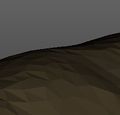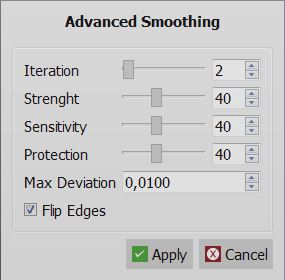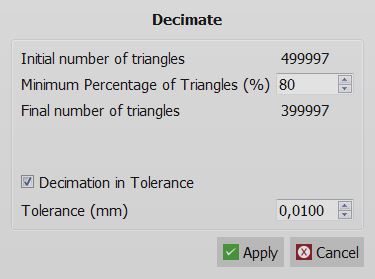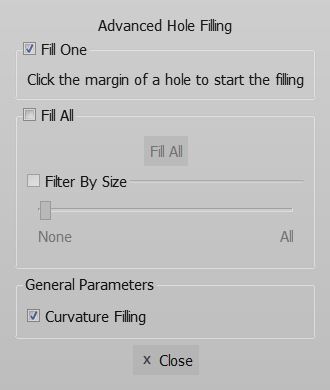Edición de Mallas
Contents
Editar Mallas
Cuando se genera una malla de un dato capturado por un escáner, es posible que sea necesario perfeccionar las mallas para ajustarlas al uso establecido:
De hecho, las mallas generadas pueden tener defectos, ruidos o agujeros.
OpticalRevEng Dental utiliza automáticamente una modalidad de generación específica para cada elemento; a pesar de eso, es posible que sea necesario editar aún más las mallas antes de la exportación a otro software.
En esta página hay una descripción de las herramientas de "Edición de Mallas" que se encuentran sea en el Menú Mallas sea en la Barra de Herramientas de Mallas.
Quitar Picos
En una malla, un "pico" es una parte pequeña de la superficie que no forma parte del objeto 3D capturado por el escáner.
Generalmente el software elimina automáticamente los picos durante la generación de mallas, pero pueden estar presentes si las mallas han sido importadas desde otro sistema.
Esta herramienta elimina todos los picos y repara la malla.
Enfocar
La herramienta de enfoque proporciona dos acciones: suaviza la parte plana de la superficie y enfoca los márgenes utilizando dos parametros:
- T [°] : este ángulo define un margen. Todas las partes de la superficie que tienen un ángulo minor de lo de T° serán enfocadas. Cuando el valor llegue a 0, toda la superficie será suavizada.
- Repeticiones: el número de los enfoques del software. Cuanto mayor sea el valor, mayor será la superficie suavizada y enfocada.
El software aplica automáticamente esta herramienta, utilizando parametros específicos. El uso de parametros diferentes podría modificar la forma y el tamaño del objeto.
Suavizar
Esta herramienta es parecida a la de Enfocar Mallas pero aplica un suavizado a toda la superficie, incluso los márgenes.
El software utiliza esta herramienta automaticamento, utilizando parametros especificos. Utilizar la herramienta con parametros diferentes podria modificar la forma y el tamano del objeto".
Suavizado Avanzado
El suavizado avanzado es una version completa de la herramienta "Suavizado" porque garantiza mayor controle, mas parametros y resultados mejores.
The parameters are:
- Iteration
- Number of times the tool will be applied.
- Strenght
- How much the tool can change the object surface. The higher the value the more the mesh is smoothed and sharpened.
- Sensitivity
- How many parts of the surface will be identified as 'Details' (margins, edges). The details parts will be sharpened, but not smoothed.
- Protection
- : How many 'Detail' parts will not be sharpened. The higher the value the less the small details are sharpened.
- Max Deviation
- How much the tool can modify the shape of the mesh. This is the maximum distance every point of the final mesh can have from the original mesh.
- Flip Edges
- If this option is enabled the tool will rearrange the mesh structure to better represent edges.
Decimate
This tool reduces the number of triangles in a mesh, to save more space, trying to preserve as much detail as possible.
On the top is specified the current number of triangles of the selected meshes.
It is possible to insert a percentage of triangles to be kept (For example 50% to halve the mesh size).
It is also possible to establish a tolerance value. If the tolerance is enabled, the software will stop the decimation when this would modify the mesh more than the tolerance parameter.
Just click on Apply to see the result.
Defeature
This tool takes a selection of the mesh and it removes all the details, leaving the surface as plane as possible. It removes holes, spikes, noises. To use this tool:
- Select the area in which it is necessary to remove all the features with the Selection Tools
- Apply the Mesh Defeature
Catenate
This tool can be used only in Free Mode. It takes all the selected meshes and creates a single mesh, merging all of the selected meshes together.
Flip Normals
Every mesh has an inside and an outside. The software gives them two different colors. This tool inverts the inside and the outside of the selected meshes.
Fill All Holes
This is an interactive tool that allows to fill the holes in the currently selected mesh.
This tool can work in 2 different ways
Fill One
In the fill one mode, the software will highlight the hole near the mouse cursor. By clicking with the left mouse button on the highlighted hole it will be filed.
Fill All
In the fill all mode, the software will try to close all the holes. With the Filter By Size function, it is possible to select all the holes below one size and fill them. The selected holes will be highlighted in real time by the sofware.
Curvature Filling
There is an additional option: curvature filling. If this option is enabled, the software will try to close the hole following the curvature of the rest of the surface. If it's disabled, the software will ignore the rest of the surface and close the hole with a straight plane.
Close Denture
When scanning a whole jaw, the base information will not be acquired. This tool has been created to recreate that information. Closing the dunture with the Fill All Holes tool takes too much time and the final result will not be good enough.
With the close denture tool, the mesh will be closed with a perfect plane in a reduced amount of time.
Fix Mesh
Removes all the possible defects and noises of a mesh.
Mesh Offset
This tool creates a bigger/smaller version of the selected mesh. The Offset [mm] parameter allows to select how much the mesh will change.
The three flags (Remesh, Sharpen and Optimize Vertices) have to be checked.
Usually, none of these tools is necessary to work because the strategies already apply a selected sequence of specific tools to each element.







